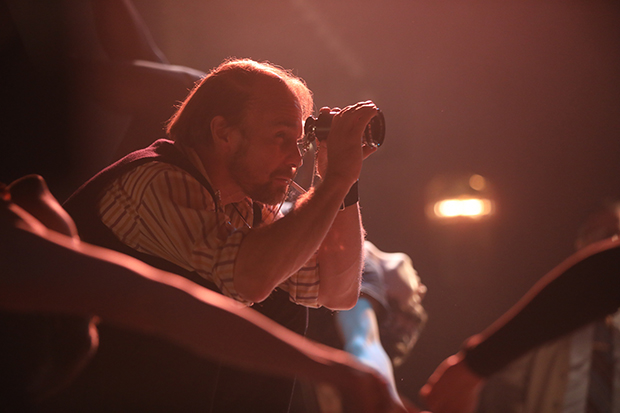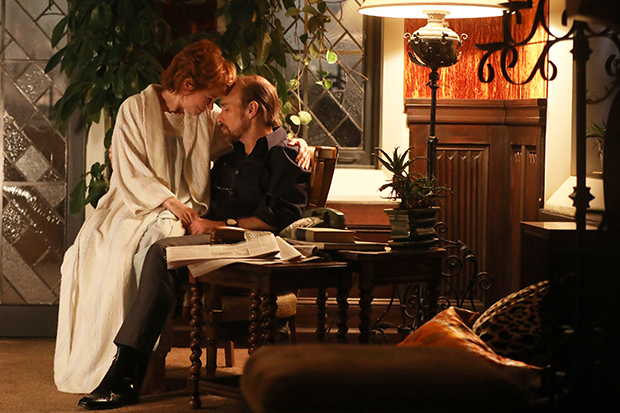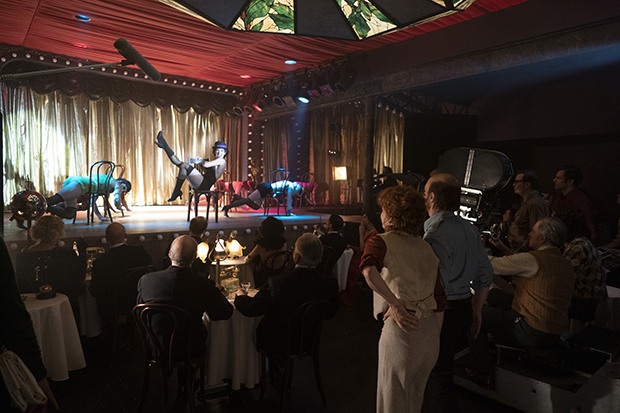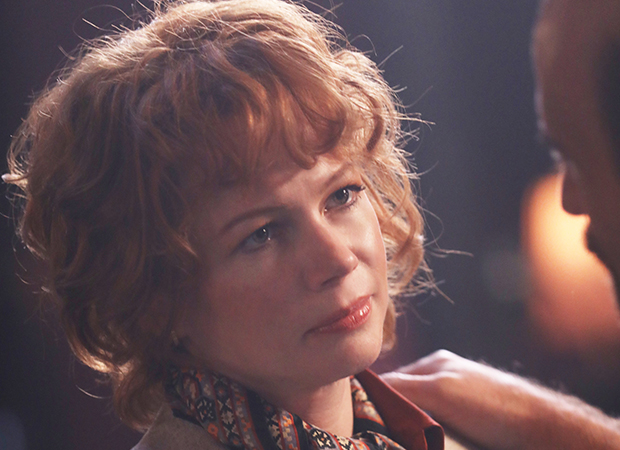Fosse/Verdon Explained: Episode 1 — "Life Is a Cabaret"
Here’s some historical context from a theater geek on the pilot of FX’s new series about Broadway legends Bob Fosse and Gwen Verdon.
Fosse/Verdon, the new FX limited series about Broadway giants Bob Fosse (Sam Rockwell) and Gwen Verdon (Michelle Williams), premiered tonight. Since we at TM spend our days immersed in the history and culture of the Great White Way, we'll be combing through all eight episodes to give theater geeks and non-theater geeks alike a little background on what they just watched.

(© Craig Blankenhorn/FX)
BACKGROUND: A Brief Look at the Career Trajectory of Bob Fosse
Fosse was a perfectionist from his earliest days. As a youngster, he was recognized as a child prodigy — his mentor, Fred Weaver (Rick Holmes) worked him to the bone in the quest for effortlessness. A professional dancer before even hitting high school, Fosse served as an emcee in burlesque houses and an entertainer in the Navy, eventually moving to the Big Apple with big dreams of being the next Fred Astaire. He had a short stint in Hollywood as a professional dancer, where he made appearances in films like Kiss Me Kate (his sultry dance during "From This Moment On" with Carol Haney launched his theatrical career).
From there, Fosse was hired to choreograph The Pajama Game (1954) on Broadway, followed by Damn Yankees (1955). It was on the latter production that he met Verdon, who was already a major player in the theater community. Before becoming Lola, Verdon earned her first of four Tony Awards for her performance in the 1953 Cole Porter musical Can-Can. But more on that in next week's episode.

(© Craig Blankenhorn/FX)
Episode 1: "Life Is a Cabaret"
Inspired by Sam Wasson's biography Fosse, the series looks at specific moments in time over the course of Bob and Gwen's decades-long and decades-rocky relationship. When we first meet them, they're staging a soon-to-be iconic number, "Big Spender," for the 1969 film Sweet Charity, which Fosse directed and choreographed. He did the same duties on the stage version of the musical several years earlier, earning one of his eight Tony Awards for Best Choreography. On Broadway, Verdon, whom he married in 1960, played the title role; Shirley MacLaine (Laura Osnes in a fleeting cameo) replaced her onscreen.
In a Broadway minute, the Sweet Charity movie goes from having great advanced buzz with positive reviews to tanking at the box office (with a $20 million budget, it only grossed $8 million domestically). Reeling from this failure, Fosse begins a hunt for his next project.
An opportunity is almost hand-delivered by renowned theater director and producer Harold Prince (Evan Handler). Kander and Ebb's musical Cabaret, which Prince staged on Broadway, is headed to the big screen. But there's one person standing in Fosse's way: Cy Feuer (Paul Reiser). On Broadway, Feuer was a hit-maker. Working with business partner Ernie Martin, Feuer produced the original productions of Guys and Dolls and How to Succeed in Business Without Really Trying (which Fosse choreographed).
Feuer is producing the screen version of Cabaret, but doesn't think that Fosse, who had become known for his style and flash, is a suitable choice for an adult musical drama. Despite Feuer promising to put in a good word with Allied Artists studio head Manny Wolf, Fosse immediately goes over his head and lands the job.
Next thing we know, Fosse is on set in Munich, while Verdon is dealing with a crisis at home. As Fosse coaxes a soon-to-be Oscar-winning performance out of Liza Minnelli (Kelli Barrett) and later beds his translator, Verdon learns that the couple's daughter, Nicole (Blake Baumgartner), brought a bottle of her dad's Seconal pills to school. But that takes a back seat when Fosse, having a crisis of confidence, asks Verdon, his muse, to fly to Germany to give him some much-needed inspiration.

(© Michael Parmelee/FX)
In Real Life…
Obviously, in a 50-minute episode, actual events are sped up and altered for dramatic effect. Sweet Charity did flop — it nearly sunk Universal Pictures. That massive failure, though, is part of the reason why Fosse landed Cabaret. According to Wasson's memoir, it seemed that Feuer did put in a good with Wolf, who eventually met with Fosse and hired him for the project. ("I knew the best time to get a talented director was after a failure," Wolf says in the book.) But there was indeed growing discord between Feuer, who was on set at all times, and Fosse, an auteur of the highest caliber. The feuds were largely over Feuer's reluctance to hire Fosse's go-to cinematographer, Robert Surtees, as well as over money, content, and the darkness of the piece.
Fosse did manage to convince Gwen to fly to Germany to help out on set. She was his muse, after all, and he was in desperate need of someone to help find costumes — the ones chosen by costume designer Charlotte Flemming weren't dingy enough to be realistic. They had a particularly hard time finding an appropriate-looking gorilla costume for "If You Could See Her," and Gwen did indeed fly to back to New York to find a real one, carrying its head, as in the episode, on her lap for the entire flight from JFK to Munich.
She also walked in on him sleeping with someone else — but according to the Wasson book, it was actually "a couple of German girls." But Fosse did indeed have an on-set affair with his translator, Isle Schwarzwald (called "Hannah" in the episode), and that was one of the many factors that led to the end of Fosse and Verdon's romance.

(© Craig Blankenhorn/FX)
Loose Ends
Early in the episode, there's a conversation between Fosse, Verdon, and Prince about Broadway. "I'm busy directing Steve's new musical," Prince says. "Am I the only one who liked the last one that he did with Dick?" Verdon replies. "What's this one about?" Fosse asks. "A single guy who can't hold down a relationship. His married friends all want him to get married even though they're all miserable," Prince explains. "I'm on the edge of my seat," Fosse says sarcastically.
If you don't know what they're talking about: The "Steve" in question is Sondheim; the musical about the single guy is Company. "The last one that he did with Dick" is Do I Hear a Waltz?, a massive flop that Sondheim wrote with Richard Rodgers.







